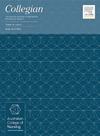Applicability and benefits of Standardised Nursing Terminology in Australia: A scoping review
IF 1.7
4区 医学
Q2 NURSING
引用次数: 0
Abstract
Background
Standardised Nursing Terminologies (SNTs) provide a set of agreed terms that are aligned to nurses’ assessments, interventions, and nurse-sensitive patient care outcomes. The use of such a terminology allows for improved visibility of nursing care and comparisons of interventions and outcomes to support and assess evidence-based practice. Whilst SNTs have been in use internationally for decades, there is a gap in practice and literature related to SNTs throughout Australia.
Purpose
The objectives of this review were to explore recent literature to identify and understand (i) the benefits of SNTs, (ii) the limitations of SNTs, and (iii) the potential scope of SNTs for the Australian context.
Methods
A scoping review was undertaken to search relevant literature in CINAHL, Cochrane Review, EMBASE, IEEE Xplore, Medline Complete, and Scopus databases using a date range of 2015–2023.
Findings
A total of 36 studies were reviewed, none of which were Australian. Main benefits associated with integrating SNTs into health records include improved nursing documentation quality, facilitate visibility of nursing care, and enable nursing practice quality improvement. Key limitations identified were the lack of evidence about correlation between nurses’ knowledge level and the use of SNT in practice, lack of strong evidence related to benefits in terms of patient outcomes, workflow efficiencies or enhanced communication, poor representation of nursing practice in SNTs, and mapping limitations to achieve interoperability.
Conclusions
In order to support SNT implementation and adoption throughout Australia, there is a need for Australian research as well as a national strategy for the adoption of an SNT taxonomy in Australia. This requires stakeholder policy development, government support to ensure standardisation, and broad education at academic and local level to enable comprehensive systems’ integration.
澳大利亚标准化护理术语的适用性和益处:范围审查
标准化护理术语(snt)提供了一套与护士的评估、干预措施和护士敏感的患者护理结果相一致的商定术语。使用这种术语可以提高护理的可见度,并对干预措施和结果进行比较,以支持和评估循证实践。虽然snt已经在国际上使用了几十年,但在整个澳大利亚,与snt相关的实践和文献存在差距。目的:本综述的目的是探索最近的文献,以确定和理解(i) snt的益处,(ii) snt的局限性,以及(iii) snt在澳大利亚背景下的潜在范围。方法在2015-2023年的CINAHL、Cochrane review、EMBASE、IEEE explore、Medline Complete和Scopus数据库中检索相关文献。研究结果共回顾了36项研究,其中没有一项来自澳大利亚。将snt集成到健康记录中的主要好处包括提高护理文件的质量,促进护理的可见性,并提高护理实践的质量。确定的主要限制是缺乏关于护士知识水平与实践中SNT使用之间相关性的证据,缺乏与患者结果、工作流程效率或加强沟通方面的益处相关的有力证据,SNT中护理实践的代表性差,以及实现互操作性的映射限制。为了支持SNT在整个澳大利亚的实施和采用,有必要进行澳大利亚的研究以及在澳大利亚采用SNT分类的国家战略。这需要利益相关者制定政策、政府支持以确保标准化,以及在学术和地方层面进行广泛的教育以实现全面的系统集成。
本文章由计算机程序翻译,如有差异,请以英文原文为准。
求助全文
约1分钟内获得全文
求助全文
来源期刊

Collegian
NURSING-
CiteScore
2.70
自引率
6.70%
发文量
127
审稿时长
72 days
期刊介绍:
Collegian: The Australian Journal of Nursing Practice, Scholarship and Research is the official journal of Australian College of Nursing (ACN).
The journal aims to reflect the broad interests of nurses and the nursing profession, and to challenge nurses on emerging areas of interest. It publishes research articles and scholarly discussion of nursing practice, policy and professional issues.
Papers published in the journal are peer reviewed by a double blind process using reviewers who meet high standards of academic and clinical expertise. Invited papers that contribute to nursing knowledge and debate are published at the discretion of the Editor.
The journal, online only from 2016, is available to members of ACN and also by separate subscription.
ACN believes that each and every nurse in Australia should have the opportunity to grow their career through quality education, and further our profession through representation. ACN is the voice of influence, providing the nursing expertise and experience required when government and key stakeholders are deciding the future of health.
 求助内容:
求助内容: 应助结果提醒方式:
应助结果提醒方式:


